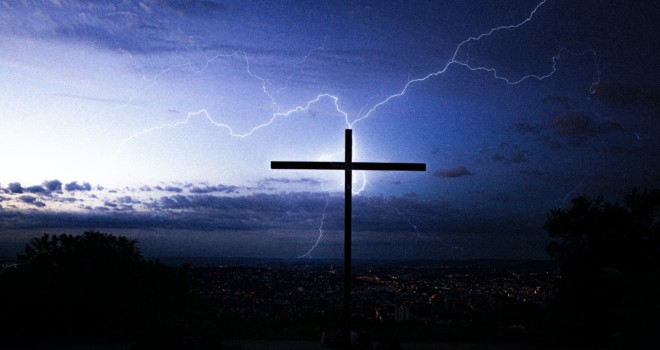What would provoke the apostles to be disappointed in Jesus? Today we find out.
Gospel (Read Mark 4:35-41)
St. Mark tells us that at the end of a day full of teaching, Jesus decided to cross over the Sea of Galilee, leaving the crowd that had gathered around Him behind. They got into a boat; at some point, “a violent squall came up,” and waves began filling the boat with water. Amazingly, Jesus was “asleep on a cushion.” Perhaps this heavy sleep was the toll of the day’s exhausting work of preaching to so many people. However, the disciples were clearly not happy with the nap.
“Teacher, do You not care that we are perishing?” Think about this question. From what did it issue? If the apostles were simply terrified, they could have awakened Jesus with a plea for help, but they went beyond that. They wanted to charge Him with indifference to their difficulty. They seemed either disappointed or even angry that He could sleep through a situation they considered life-threatening. Did they have some expectation that He could do something? After all, if we read the chapters in St. Mark’s Gospel preceding our reading today, we see that the disciples witnessed Jesus perform some amazing miracles of healing and exorcism. We might wonder what they thought He could do—give them moral support? Demonstrate superhuman ability to help them row the boat to shore? Even though we don’t know what they expected, we can see that they were indignant over Jesus’ lack of action. Did they start to wonder whether He cared much about them? Did they question their willingness to drop everything and become His disciples, feeling some uncertainty about His commitment to them?
Jesus “woke up, rebuked the wind, and said to the sea, ‘Quiet! Be still!’ The wind ceased, and there was great calm.” Then, it was Jesus’ turn to ask His disciples a question: “Why are you terrified? Do you not yet have faith?” Just as the disciples had been shocked that Jesus could sleep through a violent storm, Jesus seemed shocked that the storm had so terrified them. Was He wondering, “After all they have seen Me do, are they still not able to understand Who I am?” That certainly seems likely, because they were “filled with great awe and said to one another, ‘Who then is this Whom even wind and sea obey?’” The Jews knew from their Scriptures that God alone has power to subdue the raging seas (see Ps 89:9; 93:4; 107:28-29). At this time, early in their relationship with Jesus, the disciples perhaps thought of Him as a remarkable rabbi, a powerful exorcist, and a gifted healer without ever imagining that He was God. This suggests they were slow to fully understand Jesus. Of course, we see lots of evidence of this lack of understanding throughout the Gospels. It would ultimately be Christ’s Resurrection and Ascension into heaven that would reveal His true nature. Still, Jesus here wanted to prod them, to provoke them with His penetrating question: “Why are you terrified?”
This episode has long been treasured in the Church as a wonderful metaphor for our lives in the storms of this world as followers of Jesus. We do, in fact, know more than the disciples did about Jesus when they sat in the boat with Him and accused Him of indifference to their problem. We know He died out of love for us and rose up victorious over death for us. Yet are we still subject to the terrors of the storms that batter us on our journey home to heaven? Can we still be terrified enough of our situations that we wonder if Jesus is “asleep on a cushion,” distant and disinterested? The power Jesus has over all creation (“all authority in heaven and on earth has been given to Me”; Mt 28:18) is surely adequate to bring “great calm” into our lives if we do the one thing the disciples in the boat didn’t: “Have faith.”
Possible response: Lord Jesus, help me remember to ask, “Why am I terrified?” when life’s storms winds blow.
First Reading (Read Job 38:1, 8-11)
Recall that Job was a righteous man in God’s sight (see Job 1:1-12) whom Satan accused of having flimsy faith. The Enemy was confident that if God afflicted him, Job would accuse Him to His face, and his faithful righteousness would utterly disappear. God did exactly that, and although he was sorely tested, Job didn’t rebel against God. He did, however, wonder why, why had such calamity fallen on him. He wanted God to explain why He had dealt so harshly with His righteous follower.
God does speak to Job (“The LORD addressed Job out of the storm”), but He didn’t answer Job’s request. Instead, God reminds Job of His great power and wisdom at the dawn of creation, specifically in the formation of the sea: “Who shut within doors the sea, when it burst forth from the womb; when I made the clouds its garment and thick darkness its swaddling bands?” This question helps Job see for himself how foolish it is to question God’s wisdom, to try to call Him to account for anything that happens in the universe, the one that sprang from the power of His Word. This isn’t simply a power play on God’s part, a pulling of rank. No, God points out how beautiful and majestic creation is, how everything within it is full of meaning and synchronicity. If we can be awed by the intelligence and elegance of the universe, surely we can trust the One who dreamed it up, brought it into being, and sustains it every moment of its existence.
When we know Job’s story, as the disciples did from their Scriptures, we can better understand why Jesus was surprised at their fear and lack of faith.
Does our fear and lack of faith sometimes surprise Him, too?
Possible response: Heavenly Father, You have made Your wisdom clear in all the elements of creation. Let them always assure me that You know what You are doing.
Psalm (Read Ps 107:23-26; 28-31)
How fitting that our psalm today should remind us that when God’s people cry out to Him in the distress of a storm at sea, He has great mercy on them: “He hushed the storm to a gentle breeze, and the billows of the sea were stilled.” This description of God’s protective love for His children is a foreshadowing of exactly what we see in our Gospel today. It underscores why Jesus could be surprised that His disciples were so overtaken with fear that they found fault with Him. Perhaps they should have remembered this psalm’s lesson: “They rejoiced that they were calmed, and He brought them to their desired haven.” Perhaps we should remember that, too, and sing with the psalmist: “Give thanks to the Lord, His love is everlasting.”
Possible response: The psalm is, itself, a response to our other readings. Read it again prayerfully to make it your own.
Second Reading (Read 2 Cor 5:14-17)
In our other readings, we have had cause to ponder what the love of God for us means, especially in our times of trouble. Here, St. Paul teaches us an even deeper meaning of God’s love, one that goes beyond rescuing us from difficult circumstances and touches on the core of our existence. “The love of Christ,” St. Paul tells us, is demonstrated in His death for us. When Christ “was raised,” He permanently corrected the entire course of creation, returning it to God’s original intention and design. “He indeed died for all, so that those who live might no longer live for themselves but for Him who for their sake died and was raised.” All of us who believe in Christ, who are baptized into Him, are a “new creation.” We aren’t simply delivered from difficult circumstances, we are delivered from ourselves: “The old things have passed away; behold, new things have come.”
How small our fears should seem in light of this truth! “Why are you terrified? Do you not yet have faith?”
Possible response: Thank You, Lord Jesus, that our deliverance from death begins now, while we’re still alive. Now is when “new things have come.”
✠













